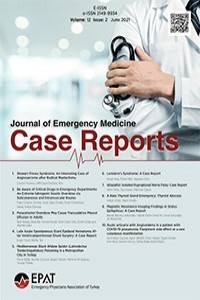A Rare Cause of Epidural Abscess: Esophageal Perforation After Radiotherapy
abscess, rupture spine, radiotherapy, paresis,
___
- 1. Reihsaus E, Waldbaur H, Seeling W Spinal epidural abscess: a meta-analysis of 915 patients. Neurosurgical review 2000;23(4):175-204.
- 2. Vakili M, Crum-Cianflone, NF Spinal epidural abscess: a series of 101 cases. The American journal of medicine 2017;130(12):1458-1463.
- 3. Bond A, Manian FA. Spinal Epidural Abscess: A Review with Special Emphasis on Earlier Diagnosis. BioMed Research International 2016;1-6.
- 4. Baron RD, Pal D, Crimmins DW, Dexter SPL. Spinal Epidural Abscess Presenting with Paraplegia Following Delayed Presentation of Traumatic Esophageal Perforation without Spinal Fracture: Lessons to be Learnt. Eur J Trauma 2010;36(3):247-9.
- 5. Ghobrial GM, Beygi S, Viereck MJ, Maulucci CM, Sharan A, Heller J, Timing in the surgical evacuation of spinal epidural abscesses. FOC 2014;37(2):E1.
- 6. Lu C-H, Chang W-N, Lui C-C, Lee P-Y, Chang H-W. Adult spinal epidural abscess: clinical features and prognostic factors. Clinical Neurology and Neurosurgery 2002;104(4):306-10.
- 7. Wang H, Tan B, Auster M, Gong G. Imaging and surgical findings of spinal epidural abscess caused by direct intraspinal spread of paraspinal infection: Correlation with spinal pneumorrhachis and its clinical implication. Radiology of Infectious Diseases 2018;5(1):41-5.
- 8. Pulle MV, Puri HV, Asaf BB, Kumar A. Two rare complications in a single patient of lung cancer: Radiation-induced spontaneous esophageal perforation and aortic rupture and their successful management. Ann Thorac Med. 2019;14(3):213-5.
- 9. Rigamonti D, Liem L, Sampath P, Knoller N, Numaguchi Y, Schreibman DL, vd. Spinal epidural abscess: contemporary trends in etiology, evaluation, and management. Surgical Neurology 1999;52(2):189-97.
- 10. Tang H-J, Lin H-J, Liu Y-C, Li C-M. Spinal Epidural Abscess—Experience with 46 Patients and Evaluation of Prognostic Factors. Journal of Infection 2002;45(2):76-81.
- Yayın Aralığı: 4
- Başlangıç: 2010
- Yayıncı: Alpay Azap
Fatma YALÇINKAYA, Oğuz Abdullah UYAROĞLU
Mustafa Can GÜZELCE, Tuğçe AÇIKGÖZ, Gürkan ERSOY
Fatih ÇALIŞKAN, Celal KATI, Hızır Ufuk AKDEMİR, Yıldıray ÇELENK
Mustafa YAKARIŞIK, Cafer AKKÖZ, Muhammed AYVAZ, Ahmet DÜLGER
Gizem MERAL ATİŞ, Tamer ALTAY, Şeref Emre ATİŞ
Bedriye Feyza KURT, Erman KURT, Oya GÜVEN, Okay KAŞIKEMAN
Atakan SAVRUN, Şeyda Tuba SAVRUN, İsmail Erkan AYDIN, Mehmet Seyfettin SARIBAŞ, Emre GÖKÇEN, Özlem ÖZDEMİR
İlker AKBAŞ, Abdullah Osman KOCAK, Alpaslan ÜNLÜ, Sinem DOĞRUYOL, Sultan Tuna AKGOL GUR
Şeref Emre ATİŞ, Öner BOZAN, Bora ÇEKMEN
Gökhan AKDUR, Okan BARDAKCI, Okhan AKDUR, Murat DAŞ, Unzile ATALAY
